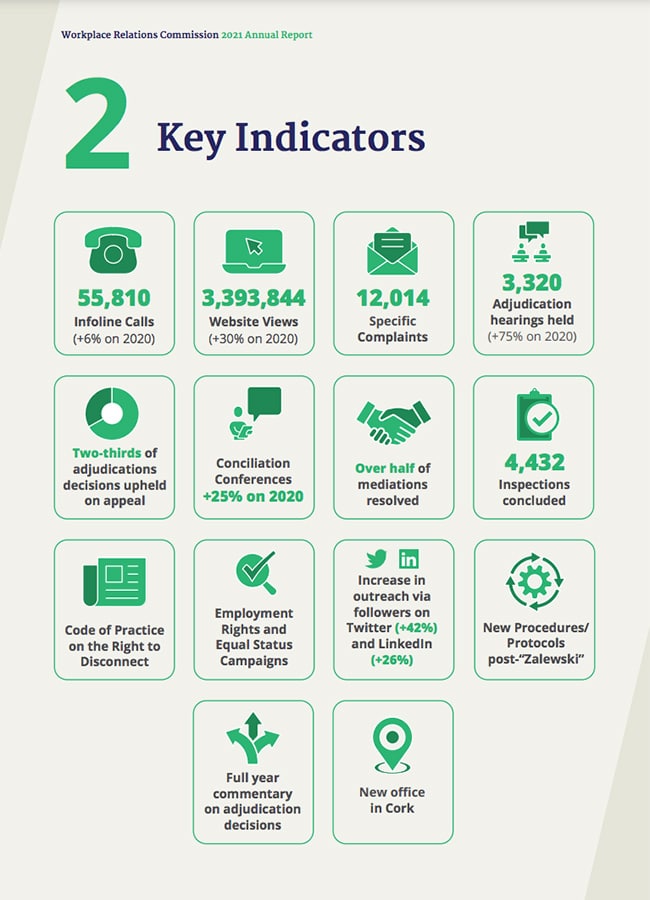The Workplace Relations Commission (WRC) recovered just under €1m in unpaid wages for employees last year, according to its 2021 annual report.
The Commission dealt with 55,810 calls, an increase of 6% year-on-year, received just over 12,000 complaints, while there was a 75% increase in the number of hearings held compared to 2020, with almost all held virtually.
In terms of inspection and enforcement activity, the WRC recovered €964,000 in unpaid wages for over 93,000 employees, concluded 4,430 employer inspection cases, and found 1,249 employers breaching employment laws.
Nearly half of the unpaid wages recovered was from businesses in the wholesale and retail trade, where 599 businesses with nearly 37,000 employees in 2,414 cases investigated were found to be in breach.
The number for requests for conciliation was stable at 689, with pay issues accounting for nearly half of requests and industrial relations such as employment conditions and union management agreements making up a quarter.
Food services activities was the sector with the second-highest number of cases (763), breaches (263) and unpaid wages recovered (€145,000 in respect of over 7,000 workers)
Issues around organisation structure such as shift work, staffing, restructuring, and change in work practices made up a fifth (20%) of requests for conciliations, with benefits (4%), redundancy (3%), types of leave (3%), pensions (2%) making up the rest.
A total of 95 disputes were referred to the Labour Court for recommendations after they could not be resolved at conciliations. Elsewhere, there were 14 industrial relations reviews referred to the WRC, two of which were completed, four were withdrawn and eight still in progress.

The WRC has five regional offices in Dublin, Carlow, Cork, Ennis and Sligo and 200 civil servants who are staff of the Department of Enterprise, Trade and Employment, supplemented by a further 44 Adjudication Officers who are contracted by on a case-by-case basis.
Director general Liam Kelly noted that Supreme Court judgment in the Zalewski case represented the most significant framework development with regard to the adjudication service of the WRC since establishment.
“The judgment in this landmark constitutional challenge found that the WRC was ‘administering justice’ but that this was permissible under Article 37 of the Constitution which creates a stratum of bodies exercising limited powers and functions of a judicial nature," said Kelly.
“This judgment changed fundamentally the adjudicative model from that in existence between 2015 and 2021 to one where the service must act consistent with the full standards expected in a higher court both in terms of processing and hearing complaints, i.e. hearings should take place in public, decisions published that, for the most part, name the parties, and an oath must be administered where there may be a serious and direct conflict of evidence.
“The judgment also required significant amendments to processes and procedures to enable members of the public attend what were mainly virtual hearings, witness guidelines on the oath and affirmations translated into ten languages, guidance on public hearings and the term ‘special circumstances’, updated guidance on adjudications before the WRC introducing a new timeframe for evidence and submissions."
Kelly added that the WRC increased the number of hearings by 75% on 2020.
“This has resulted in a position where almost all cases received prior to Covid that can be progressed have now been disposed of, heard, or scheduled and, with the exception of a single-issue occurrence of 1,600 multiple complaints (which are being dealt with by way of a small number of prototype hearings) the majority of complaints submitted in 2020 have been dealt with or have been scheduled.
“The remainder will be scheduled for a hearing within six months, and any received in 2021 that have not been heard or given a hearing date will be scheduled by the end 2022.
“Current cases should anticipate a median time of ten months from submission of complaint to issuing of decision in situations where there are no delays due to parties’ unavailability or where submissions are not received,” Kelly explained.
The director general also noted that the WRC has witnessed a number of instances where multiple identical complaints were submitted against the same employer.
“The WRC would continue to encourage all parties to deal with such matters en masse where at all possible,” he said.
(Pic: Getty Images)











